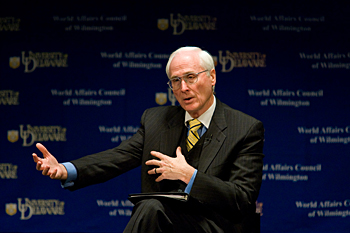The talk, titled “Implications for U.S. National Security,” was the final lecture for the spring semester in UD's 2008 Global Agenda series, “Boiling Point: International Politics of Climate Change.”
Maj. Gen. Richard L. Engel, USAF (ret.), who is U.S. Deputy National Intelligence Officer for Science and Technology in the Office of the Director of National Intelligence, outlined the ways in which a National Intelligence Assessment (NIA) on the national security ramifications of global climate change has been compiled. Engel has served as a senior military analyst with the Strategic Assessments Group of the Office of Transnational issues of the Central Intelligence Agency.
In creating an NIA on global climate change, Engel explained, “The first question that we had to answer is...'How is the climate going to change?' To answer that [question], we really depended upon the open source of the scientific community to give us some help.”
Engel then listed the organizations that the National Intelligence Council relied upon for help assessing the ways in which the climate might change, including the United Nations Intergovernmental Panel on Climate Change (IPCC), the Center for Naval Analysis and the Center for International Earth Science Information Network at Columbia University.
“What I'm going to [show] you in the next bunch of slides is what we have been told. It reflects the views of outside experts and it is not necessarily endorsed by the U.S. government,” Engel explained.
“Here's the challenge: the scientific community has excellent global atmospheric models to describe the global atmospheric impact of climate change, but if you go away from the global community and you try and [make projections for] a specific country or a specific region, the science is not yet developed that well.”
With regards to national security, some of the main areas of concern when it comes to climate change are water and agriculture, he said.“There could be a very rapid change in water availability, and this could result in a significant instability in migration," Engel said. "Migration is one of the major issues that, from a national security point, we're sensitive to because as people migrate, how are they going to be received? Are they going to be received constructively or destructively inside of a country or a community, and what will that mean in terms of how these communities react?”
Noting that agricultural productivity is closely tied to changes in the water supply, Engel said that if food sources become depleted around the world because of climate change, migration to the parts of the world that still have dependable food supplies will likely increase.
One of the biggest problems that the National Intelligence Council faced when writing their NIA, Engel said, was the fact that they could be either overestimating or underestimating the problem of climate change. He said they took a middle-of-the-road position in dealing with the issue, conceding that because of this stance, “...[I]t could be a lot worse, or we could have been wrong, and it could potentially be not as bad.”
Article by Adam Thomas
Photos by Kevin Quinlan



